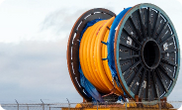AAC vs. AAAC vs. ACSR: Cómo elegir un cable aéreo de transmisión desnudo

Los tres cables más populares para líneas de transmisión y distribución de aluminio son AAC, AAAC y ACSR. Este blog destaca las diferencias entre los tres y las mejores aplicaciones para cada cable.
AAC: Cable conductor totalmente de aluminio: Características y usos
Los cables AAC cuentan con conductores trenzados de aluminio puro con una pureza del 99,7 %. Estas características de los conductores de aluminio confieren al cable una alta resistencia a la corrosión.
Las aplicaciones típicas del cable de aluminio AAC son:
- Líneas eléctricas aéreas en zonas costeras donde los cables están sujetos a corrosión.
- Industrias de servicios públicos ferroviarios y de metro
- Líneas eléctricas en ciudades y áreas urbanas
AAAC: Cable conductor de aleación de aluminio: características y usos
El cable de servicios públicos AAAC tiene un conductor de aleación de aluminio en lugar de aluminio puro. El grado específico de aleación de aluminio utilizado en estos cables es 6201-T81. Esta aleación de alta calidad cumple con las normas nacionales e internacionales.
El cable AAAC también presenta mejores propiedades de flecha y una mejor relación resistencia-peso que otros cables de transmisión. Este cable posee una resistencia mecánica superior a la de otros tipos de cables de distribución, lo que lo hace adecuado para conductos aéreos.
La resistencia a la corrosión de estos cables es mejor que la de los cables de servicios públicos ACSR, pero peor que la de los cables AAC.
- Los cables AAAC se utilizan habitualmente en líneas eléctricas aéreas que cruzan ríos y en zonas frías. Se emplean en lugares menos expuestos a la corrosión que los cables AAC habituales.
ACSR: Cable conductor de aluminio reforzado con acero: Características y usos
Los cables ACSR son cables con conductores de aluminio reforzados con acero. Los conductores son de aluminio, pero tienen un núcleo de acero reforzado.
El contenido de acero varía de un cable a otro, oscilando entre el 6 % y el 40 %. Cuanto más acero contenga, mayor será la resistencia del conductor.
Los conductores ACSR tienen mayores diámetros que los AAC y AAAC, lo que reduce el efecto corona. El cable ACSR es resistente sin comprometer la capacidad de corriente. Esta característica es excelente para líneas eléctricas de alta y extra alta tensión.
Gracias al refuerzo de acero, el ACSR posee una resistencia a la tracción superior a la de sus homólogos. Esto permite que el cable recorra largas distancias sin esfuerzo.
A pesar de su resistencia, el acero del cable ACSR es propenso a la corrosión, por lo que este cable no se utiliza en condiciones de humedad.
Los cables ACSR se utilizan en:
- Líneas eléctricas aéreas
- Instalaciones aéreas que cruzan el río
- Instalaciones aéreas extralargas
- Instalaciones eléctricas aéreas no ubicadas en zonas urbanas y rurales
- Líneas eléctricas de alta y extra alta tensión
La variante menos común de este cable, el AACR, cuenta con un conductor de aluminio reforzado con acero. Este cable ofrece una conductividad superior a la del cable de aluminio ACSR convencional.
Elegir un cable para mi proyecto
Las redes aéreas de transmisión utilizan cables con conductores de aluminio . En líneas eléctricas aéreas, el cable de aluminio AAC es superior, seguido de cerca por el AAAC. Sin embargo, el cable de aluminio ACSR también tiene sus propias ventajas.
- El ACSR posee una excelente resistencia a la tracción y puede cubrir distancias muy largas. Sin embargo, este cable, en comparación, no es resistente a la comba y es propenso a la corrosión.
- AAAC es el cable más eficaz contra las curvas, con buena resistencia a la corrosión, conductividad y relación resistencia-peso.
- El AAC es el mejor cable en cuanto a conductividad y resistencia a la corrosión. Además, es el más ligero.
Sea cual sea el cable que elija, estos son los cables estándar más importantes para líneas eléctricas de todo el país. NNC es líder en la venta de cables ACSR, AAC y AAAC , con algunos de los mejores precios en productos de alta calidad. Los cables de transmisión y distribución de aluminio se encuentran entre los más populares de nuestra gama de productos.


















